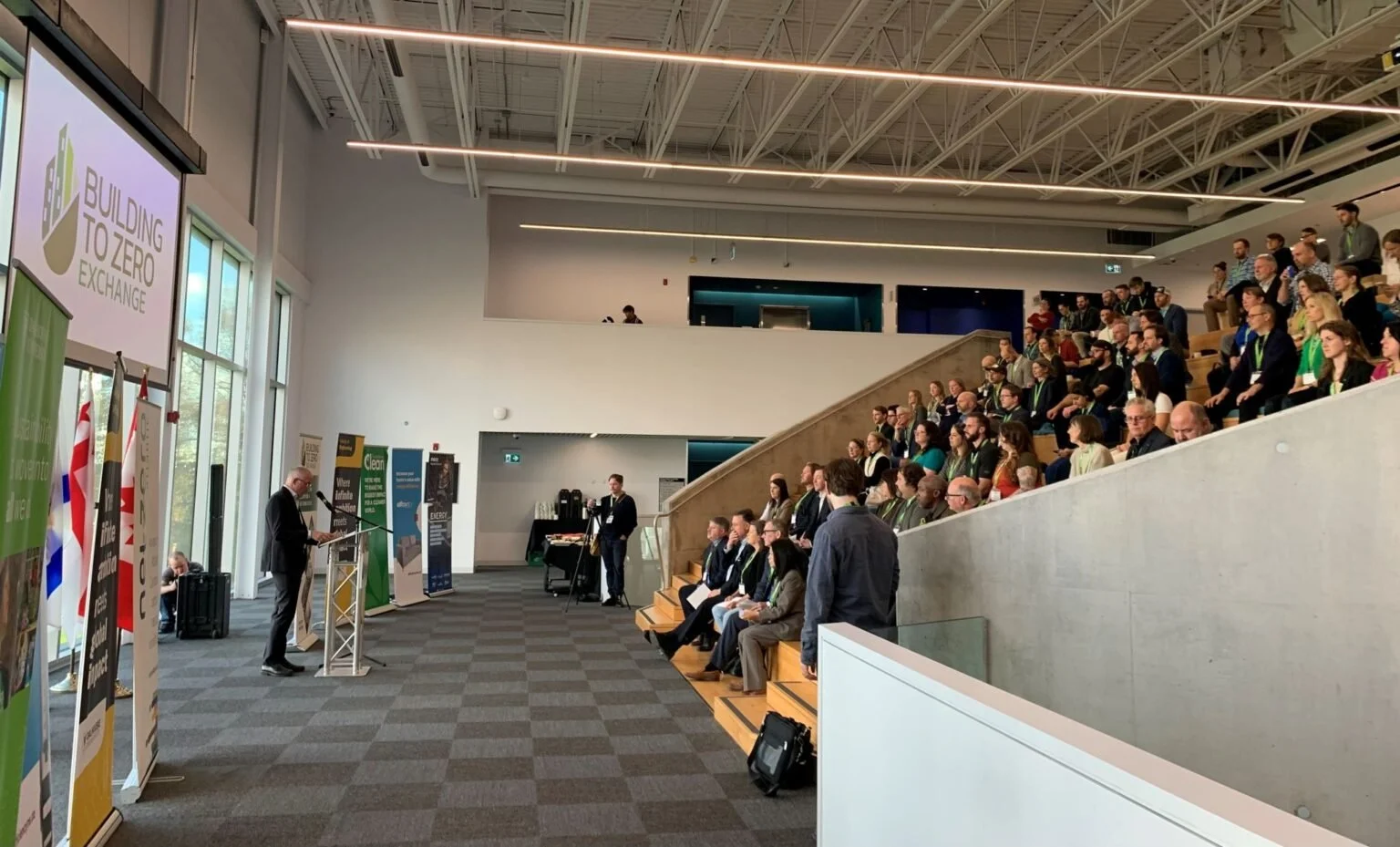Building to Zero Exchange
This project will move the Building to Zero Exchange to its next stage of development. A feasibility study in 2022-23 engaged over 75 stakeholders to assess the interest in and need for a centre of green building excellence in Nova Scotia. The envisioned collaborative model organization will support the sector and others who are committed to net-zero market transformation by showcasing leadership, inspiring local innovation, and promoting collaboration, equity and workforce opportunities in the low-carbon transition. In this phase of work, project partners, including the Construction Association of Nova Scotia, Dalhousie University, Province of Nova Scotia, HRM, EfficiencyOne, Clean Foundation, and the Nova Scotia Community College, will develop a governance structure and engage in strategic planning to lay the foundations for the organization, leading to a launch event in the early fall.
Grant award: $50,000
On October 24th, Halifax saw the launch of an exciting new organization: the Building to Zero Exchange (BTZx, or the Exchange). The Exchange seeks to advance cross-sectoral collaboration and capacity building within the building industry with a focus on low-carbon buildings.
This is a particularly big step for Halifax, because like in many Canadian cities, buildings account for a significant part of its greenhouse gas (GHG) emissions. For this reason, buildings play a large role in the net-zero transition. “When you account for materials and operations, buildings can be some 45% of our GHG emissions,” says Lara Ryan, consultant with the Exchange.
Because of its many moving parts, the building sector employs an incredibly diverse range of professionals, including engineers, architects, designers, and construction professionals. To ensure that buildings are being constructed to specific standards, there must be cohesion between all of these networks. This is especially relevant today with the industry’s goal to be net-zero by 2050, and similar targets set by the federal, provincial and municipal governments. To address this, organizations across the country are engaging in and supporting this work, including the Zero Emissions Building Exchange (ZEBx) in Vancouver. Until recently, this work remained a gap in the building industry in Halifax/Kjipuktuk.
About a year and a half ago, Ryan began to explore the possibility of an organization similar to ZEBx for Atlantic Canada. This work culminated in the public launch of BTZx. “We had overwhelming support for the value of [this] kind of organization that [acts] as convener and a collaborator. Not a physical place, but a virtual place for professionals in the sector to engage with each other and learn from each other,” said Ryan about the reception of the Exchange.
The second grant supported the development of a governance structure and strategic plan leading up to the organization’s public launch. The Exchange is built on the strong relationship between the Exchange and its secretariat, Net Zero Atlantic, and with its seven foundational partners: EfficiencyOne, Dalhousie University, the Nova Scotia Community College (NSCC), Clean Foundation, the Construction Association of Nova Scotia, Halifax Regional Municipality, and the Province of Nova Scotia. The Exchange has also established a network of members, with 35 organizations already signed up at the time of the public launch.
The Exchange is a two-time recipient of HCi3’s Accelerating to Zero grant. The first grant supported a series of stakeholder engagements from 75 different organizations, and a feasibility study that assessed the need and interest in developing a coordinating organization focused on green building excellence. “There was a lot of enthusiasm for the idea, and a lot of commitment for support from stakeholders, and not just because they’re seeing it work in other places; I think people are seeing the value, and I’ve certainly seen a shift in the 15 or so years that I’ve been working in the green building space in Atlantic Canada to this more collaborative model, and away from the competitive hold of information.”
In order to support the industry’s goal of becoming net-zero by 2050, Ryan and team have identified three central themes to address: building capacity (fostering collaboration and identifying gaps in training and research), enabling conditions (how to support the engagement of industry in developing and adopting policies and codes), and accelerating action (effectively collaborating with industry, government, academia, and others to test ideas that can be scaled for maximum impact). “How do we take some ideas and really put some oomph behind them so things happen faster? Are we supporting pilot projects? Are we initiating ideation demonstration projects?” continued Ryan. “How do we get us moving?”
In line with the central themes, the Exchange has addressed a need within the building industry for climate literacy. All buildings are expected to be net-zero by 2050; this is not reflected in the training of industry professionals. To help address this, the Exchange is working with NSCC to develop a micro-credential around climate literacy that will be offered at NSCC and also delivered by other groups including the Construction Association of Nova Scotia. “We’re helping to create a resource and then execute the resource – but not as our own training organization.” This is one example of how the Exchange is helping to build capacity within the industry.
With their official, public launch underway, the Exchange is now looking to recruit for internal positions – if you’re interested in working with them, keep an eye out for their upcoming job postings! If you’re interested in becoming a member, make sure to check out their website – membership is free and accepted on a rolling basis.






![[Em]powering Communities](https://images.squarespace-cdn.com/content/v1/65677c41fb8cf009f5d366c4/1715882367207-MAHE6ULPQSHGBSQ6BOMJ/image-asset.jpeg)